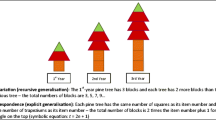Abstract
Algebra has been recognised for some time as a difficult topic for many secondary school students. Discovering the best way(s) of introducing algebra into the students' experience and fostering understanding has stimulated much discussion and research. It is our belief that an understanding of the concept of variable is fundamental to further student progress in algebra. This paper describes a study using a module of work based on a graphic calculator which provided an environment where students could experience some aspects of variables and hence begin to build an understanding of them. The graphic calculator proved to be an instrument for achieving a significant improvement in student understanding, something which has often proved difficult previously.
Similar content being viewed by others
REFERENCES
Cottrill, J., Dubinsky, E., Nichols, D., Schwingendorf, K., Thomas, K. and Vidakovic, D.: 1996, 'Understanding the limit concept: beginning with a coordinated process scheme', Journal of Mathematical Behavior 15, 167-192.
Dubinsky, E. and Lewin, P.: 1986, 'Reflective abstraction and mathematics education: The genetic decomposition of induction and compactness', Journal of Mathematical Behavior 5(1), 55-92.
Dubinsky, E.: 1991, 'Reflective abstraction in advanced mathematical thinking', in D. Tall (ed.), Advanced Mathematical Thinking, Kluwer Academic Publishers, Dordrecht, pp. 95-123.
Graham, A. and Galpin, B.: 1998, Calculator Maths, Corby, UK: A+B Books.
Gray, E. and Tall, D.O.: 1991, 'Duality, ambiguity and flexibility in successful mathematical thinking', Proceedings of the 15th Conference of the International Group for the Psychology of Mathematics Education, Assisi 2, 72-79.
Gray, E. and Tall, D.O.: 1994, 'Duality, ambiguity and flexibility: A proceptual view of simple arithmetic', Journal for Research in Mathematics Education 26, 115-141.
Hong, Y.Y. and Thomas, M.O.J.: 1998, 'Versatile understanding in integration', Proceedings of the International Congress of Mathematics Instruction-South East Asian Conference on Mathematics Education, Seoul, Korea, pp. 255-265
Kieran, C.: 1981, 'Pre-algebraic notions among 12 and 13 year olds', Proceedings of the Eighteenth International Conference of the International Group for the Psychology of Mathematics Education, Grenoble, pp. 158-164.
Kieran, C.: 1994, 'A functional approach to the introduction of algebra-some pros and cons', Proceedings of the Eighteenth International Conference of the International Group for the Psychology of Mathematics Education, Lisbon, Portugal, I, pp. 157-175.
Kota, S. and Thomas, M.O.J.: 1998, 'Students' arithmetic preferences: effect on problem solving ability', Hiroshima Journal of Mathematics Education, Hiroshima, Japan: Hiroshima University, 6, 33-48.
Küchemann, D.E.: 1981, 'Algebra', in K.M. Hart (ed.), Children's Understanding of Mathematics: 11-16, John Murray, pp. 102-119.
Leitzel, J.R.: 1989, 'Critical considerations for the future of algebra instruction or A reaction to: algebra: what should we teach and how should we teach it?', in S.Wagner and C. Kieran (eds.), Research Issues in the Learning and Teaching of Algebra, NCTM, Reston: Lawrence Erlbaum, pp. 25-32.
Linchevski, L. and Herscovics, N.: 1996, 'Crossing the cognitive gap between arithmetic and algebra: operating on the unknown in the context of equations', Educational Studies in Mathematics 30, 39-65.
MacGregor, M. and Stacey, K.: 1997, 'Students' understanding of algebraic notation', Educational Studies in Mathematics 33, 1-19.
Penglase, M. and Arnold, S.: 1996, 'The graphics calculator in mathematics education: a critical review of recent research', Mathematics Education Research Journal 8(1), 58-90.
Ruthven, K.: 1990, 'The Influence of graphic calculator use on translation from graphic to symbolic forms', Educational Studies in Mathematics 21, 431-450.
Schoenfeld, A. and Arcavi, A.: 1988, 'On the meaning of variable', Mathematics Teacher 81(6), 420-427.
Sfard, A. and Linchevski, L.: 1994, 'The gains and pitfalls of reification-the case of algebra'. Educational Studies in Mathematics 26, 191-228.
Sfard, A.: 1991, 'On the dual nature of mathematical conceptions: reflections on processes and objects as different sides of the same coin', Educational Studies in Mathematics 22(1), 1-36.
Sfard, A.: 1994, 'Reification as the birth of metaphor', For The Learning of Mathematics 14(1), 44-54.
Sfard, A.: 1995, 'The development of algebra: confronting historical and psychological perspectives', Journal of Mathematical Behavior 14, 15-39.
Skemp, R.R.: 1971, The Psychology of Learning Mathematics, Penguin, Middlesex, UK.
Skemp, R.R.: 1979c, Intelligence, Learning and Action: -A Foundation For Theory And Practice In Education, Wiley, Chichester, UK.
Stacey, K. and MacGregor, M.: 1997, Learning to Use Algebra for Solving Problems: Research findings and their implications for Mathematics Education policy, Department of Science and Mathematics Education, The University of Melbourne.
Tall, D.O. and Thomas, M.O.J.: 1991, 'Encouraging versatile thinking in algebra using the computer', Educational Studies in Mathematics 22, 125-147.
Tall, D.O. and Vinner, S.: 1981, 'Concept image and concept definition in mathematics, with special reference to limits and continuity', Educational Studies in Mathematics 12, 151-169.
Thomas, M.O.J.: 1994, 'A process-oriented preference in the writing of algebraic equations', Proceedings of the 17th Mathematics Education Research Group of Australasia Conference, Lismore, Australia, pp. 599-606.
Thomas, M.O.J., Tyrrell, J. and Bullock, J.: 1996, 'Using computers in the mathematics classroom: the role of the teacher', Mathematics Education Research Journal April, 8(1), 38-57.
Wagner, S., Rachlin, S.L. and Jensen, R.J.: 1984, Algebra Learning Project-Final Report, Department of Mathematics Education, University of Georgia.
Author information
Authors and Affiliations
Rights and permissions
About this article
Cite this article
Graham, A.T., Thomas, M.O. Building a versatile understanding of algebraic variables with a graphic calculator. Educational Studies in Mathematics 41, 265–282 (2000). https://doi.org/10.1023/A:1004094013054
Issue Date:
DOI: https://doi.org/10.1023/A:1004094013054




